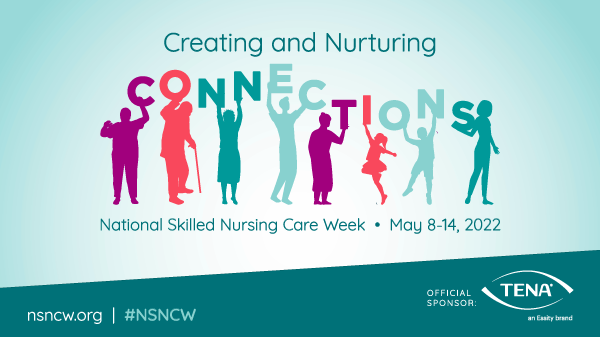Boost Your Geriatric RN Skills in 2022 with AHCA/NCAL’s Gero Nurse Prep
- Two fewer deficiencies on average (5.71 citations versus the 7.55 national average in last cycle)
- Fewer Immediate Jeopardy (IJ) citations (1.60 versus the 2.27 national average)
- More stars — nearly twice as likely to be a CMS 5-Star facility (50% versus the 28% national average)
- Significantly lower re-hospitalization rates over the previous six years
- Significantly lower rates of off-label use of antipsychotics over the previous five years
- Significantly higher average SNF Value Based Purchasing scores (44.17 versus 34.42 for the nation). Higher SNF VBP Score = Higher Medicare Part A reimbursement rates.
Nursing Ranked as the Most Trusted Profession for 20th Year in a Row!
2021 was a year for nurses and while there are many things that could be said about that, we’re just going to bring some good news out of it:
For an impressive 20-year running, nursing was rated as the most trusted profession once again in 2021, according to a Gallup poll. To be perfectly frank, 2021 saw some marked changes in how some professions are perceived in trustworthiness—military officers, for example, fell by a full 10 points from 2017 and even grade-school teachers dropped to almost all-time lows.
It appears that American people are more cautious about who they are handing out their trustworthy badges to, so that makes the fact that nursing nabbed the #1 spot yet again—for the 20th year in a row!—all the more impressive.
Read more at https://nurse.org/articles/nursing-ranked-most-honest-profession/
CMS Issues Letter on the Importance of COVID-19 Staff Vaccinations
Today, the Centers for Medicare and Medicaid Services Administrator Chiquita Brooks-LaSure issued a letter to health care facility administrators on the importance of COVID-19 staff vaccinations and the current CMS requirements. CMS recommends that facilities review the vaccine rule guidance released on December 28, 2021; January 14, 2022; and January 20, 2022 for additional information.
https://www.cms.gov/files/document/health-care-facility-administrator-covid-19-vaccine-letter.pdf
CMS Adds Staffing Measures to Five Star Rating System
- Weekend Staffing: The level of total nurse (RN, LPN & CNA) and registered nurse (RN) staffing on weekends provided by each nursing home over a quarter. This will be reported as average hours worked per resident per day on weekends.
- Staff Turnover:
- The percent of RN staff that left the facility over the last year.
- The percent of total nurse staff that have left the facility over the last year.
- The number of administrators that have left the facility over the last year.
Find out more at https://bit.ly/3Ai2VLo
RN Huddle – Treat the Nurse Part 2
In this podcast, we welcome back Ashleigh Boyd. Ashleigh founded the “Treat the Nurse” program, found at https://www.treatthenurse.com, to help nurses with burnout and compassion fatigue. In this episode Ashleigh is once again joined by host Heidi Keeler and they are focusing not only on burnout but also secondary stress and how to (once again) combat it.
Nurses, that self-care is important and remember to take care of yourselves as well as you take care of your patients. Keep up the good work and we can’t wait to keep you up-to-date on everything nursing in 2022!!
RN Huddle Podcast – Treat the Nurse Part 1.
On this episode of RN Huddle, our host Heidi Keeler is back and talking burnout in nursing with an expert in the field, Ashleigh Boyd. Ashleigh created the “Treat the Nurse” program surrounding the nurse and their wellbeing. Focusing on self-care and empowerment, Treat the Nurse is the only program for nurses by nurses (sounds familiar?!). Part 1 will take on compassion fatigue and Ashleigh’s expertise on how nurses can combat it.
New Year – New Beginnings!
Is 2022 the year you’ve decided to become ANCC board certified? If so, take the proven path to preparing for the gerontological board certification exam – AHCA/NCAL Gero Nurse Prep!
Find out more at https://www.geronurseprep.com/
Wishing You All the Best This Holiday Season!
From the faculty and staff of the AHCA/NCAL Gero Nurse Prep program.
Facing COVID With Creativity, Connections, and Resilience
After a devastating storm, the signs of life—children going to school, lights coming on after days of power outages, neighbors talking and laughing—are powerful reminders of people’s resilience and the importance of their connections to each other. Even though the pandemic isn’t completely over, it has led to some changes, innovations, and inspiring stories that should be embraced and remembered moving forward.
One impact of COVID-19 has been a bit of a double-edged sword. The pandemic has shown a spotlight on nursing homes and other long term care facilities. While this has brought some negative and often unfair media coverage, it also presents opportunities.
As James Wright, MD, CMD, a multifacility medical director in Virginia, says, “For a brief period of time, the public was more interested than ever in what goes on in nursing homes, especially with staffing. If we take this interest and harness it into legislative and regulatory changes, we can translate this into better funding and staffing.”
Read more at https://bit.ly/3IUH1RY








